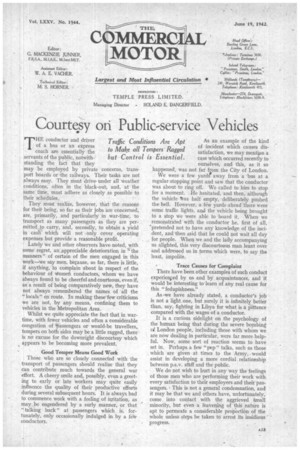Court6y on Public-service Vehicles
Page 15

If you've noticed an error in this article please click here to report it so we can fix it.
THE conductor and driver of a bus or an express coach are essentially the servants of the public, notwithstanding the fact that they may be employed by private concerns, transport boards or the railways. Their tasks are not always easy. They must driveunder all weather conditions, often in the black-out, and, at the same time, must adhere as closely as possible to their schedules.
They must realize, however, that the reasons for their being, so far as their jobs are concerned, are, primarily, and particularly in war-time, to transport as many passengers as they are permitted to carry, and, secondly, to obtain a yield in cash which will not only cover operating expenses but provide a reasonable profit. , Lately we and other observers have noted, with some regret, an _appreciable deterioration in 7` the manners" of certain of the men engaged in this work—We say men, because, so far, there is little, if anything, to complain about in respect of the behaviour of Women conductors, whom we have always found to be cheerful and courteous, even if, as a result of being comparatively new, they have not always remembered the names of all the "locals" en route. In making these-few criticisms we are not, by any means, confining them to vehicles in the Metropolitan Area.
Whilst we quite appreciate the fact that in wartime, with fewer vehicles and often a considerable congestion of passengers or would-be travellers, tempers on both sides may be a little ragged, there is no excuse for the downright discourtesy which appears to be becoming more prevalent.
Good Temper Means Good Work Those who are so closely connected with the transport of passengers should realize that they can contribute much towards the general war effort. A cheery smile and, possibly, even a greeting to early or late workers may quite easily influence the quality of their productive efforts during several subsequent hours. It is always bad to commence work with a feeling of irritation, as may be engendered by a surly manner, or that "talking back" at passengers which is, fortunately, only occasionally indulged in by a few conductors. As an example of the kind of incident which causes dissatisfaction, we may mentipn a case which occurred recently to ourselves, and this, as it so happened, was not far from the City of London. We were a few yard away from a -bus at a regular stopping point and saw that the conductor was about to ring off. We called to him to stop for a moment. He hesitated, and then, although the vehicle as half empty, deliberately pushed thebell. However, a few yards ahead there were some traffic lights, and the vehicle being brought to a stop we were able to board it. When we remonstrated with the conductor he, first of all, 'pretended not to have any knowledge of the incident, and then said that he could not wait all day for people. When we and the lady accompanying us alighted, this very discourteous man leant over and addressed us in terms which were, to say the least, impolite.
Trace Causes for Complaint There have been other examples of such conduct experienped by us and by acquaintances, and it Would be interesting to-learn of any real cause for this " fedupishness."
As we have already stated, a conductor's job is not a light,one, but surely it is infinitely better than, say, fighting in Libya for what is a pittance compared with the wages of a conductor.
It is a curious sidelight on the psychology of the human being that during the severe bombing a London people, including those with whom we are now dealing in particular, were far more helpful. Now, some sort of reaction seems to have set in. Perhaps a few "pep" talks, such as those which are given at times to the Army, would assist in developing a more cordial relationship between p.s.v. stiff and the public.
We do not wish to hurt in any way the -feelings of those men who are performing their work with every satisfaction to their employers and their passengers. This is not a general condemnation, and it may be that we and others have, unfortunately, come into contact with the aggrieved -Small minority, but even a leavening of this nature is apt to permeate a considerable proportion of the whole unless steps be taken to arrest its insidious progress.




















































